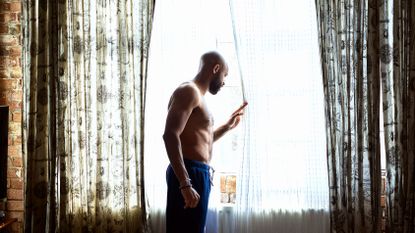Will getting up at 5am every day ruin your health, or make you more productive?
Should you join the 5am club for maximum productivity? Here's what the science says


Waking up early is most commonly seen as the trait of go-getters and successful people. The internet is full of advice from actors, entrepreneurs, and CEOs who evangelise the idea of getting up early and getting things done in the small hours in which everyone else is asleep.
Whether you're using one of the best sunrise alarm clocks to wake up early, or starting your day with a quick HIIT workout, joining the 5am crowd is all about carving out more time in the day. Time to work out in the gym, meditate, make a healthy breakfast, take on personal projects, or get a head start on that email inbox.
However, the biggest obstacle to waking up early is that in order to have a productive day, you also need to go to bed early. Research shows that short sleep duration, six hours or less, has been "significantly associated" with an increased prevalence of depressive symptoms, in addition to a host of other problems such as weight gain, increased production of the stress hormone cortisol, and high blood pressure.
Late bedtimes have also been associated, by the same study, with "an increased prevalence of depressive symptoms". So early nights and early mornings seem to be the way forward, as "high morningness" is associated in another study with lower procrastination, as you tackle more unpleasant tasks earlier in the day.
But social events, family obligations, and "life admin" tasks tend to catch up with you in the evenings. In order to get up early and be well-rested you need to cancel social events in the evening, cook, clean, put all other evening obligations to one side and be asleep by 10pm.
This is the trouble that documentary filmmaker Matt D'Avella found when he tried to get up at 5am. In a video which has garnered almost five million views on YouTube, he chronicled what happened when he began getting up at 5am every day.
In the video, travel to a different time zone, social events, and other hiccups occurred before D'Avella settled into a routine.
Get the Fit&Well Newsletter
Start your week with achievable workout ideas, health tips and wellbeing advice in your inbox.
"When I try to wake up early, build a habit or start exercising, eventually something's going to happen. You're going to get sick, travel, go on vacation, get jet lag... you're not going to be able to keep up with the same routine you're trying to build."
D'Avella ended up with an extremely unproductive month before he found workouts, beginning at 5:30am, were the key to structuring his morning around.
He ended the challenge with a negative view of the 5am club, as not only was D'Avella poorly rested but so was his girlfriend, who was disturbed every morning by D'Avella's easily rising habit. If you get up at 5am without adequate sleep on a regular basis, you may end up depriving yourself consistently of much-needed sleep, which has a serious impact on your health.
However, there's no denying that carving extra time out of your day, when everyone else is asleep, still does have a bit of romance to it. If you can adjust your sleeping schedule so you can get at least seven hours' solid rest (perhaps look into picking up one of the best mattress toppers) then a 5am start might be the key to, for example, completing a Couch to 5K challenge for the first time, or learning how to meditate. The only way to know for sure is to try.
Matt Evans is an experienced health and fitness journalist and is currently Fitness and Wellbeing Editor at TechRadar, covering all things exercise and nutrition on Fit&Well's tech-focused sister site. Matt originally discovered exercise through martial arts: he holds a black belt in Karate and remains a keen runner, gym-goer, and infrequent yogi. His top fitness tip? Stretch.
-
 I struggled to achieve full range of motion in my hips until I tried this one hip-loosening stretch for five minutes a day
I struggled to achieve full range of motion in my hips until I tried this one hip-loosening stretch for five minutes a dayStretching Can a stretch be life-changing? This hip stretch certainly was for me
By Lou Mudge Published
-
 Forget push-ups—try this trainer’s bodyweight alternative to develop your strength and mobility
Forget push-ups—try this trainer’s bodyweight alternative to develop your strength and mobilityWorkout The beast push-up can help you build functional strength and protect yourself from injury, whatever your fitness level
By Harry Bullmore Published